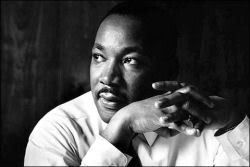Science, power and spirit: Thoughts on the King holiday
"Our scientific power has outrun our spiritual power. We have guided missiles and misguided men."
-- Martin Luther King Jr., Strength to Love, 1963
 In a poignant essay published in today's Raleigh News & Observer, Sally Buckner recounts what happened in one classroom at North Carolina State University on the day of Martin Luther King Jr.'s tragic assassination 40 years ago this coming April. James Wallace, instructor for Buckner's history of science class, set aside his lecture notes and delivered an hour-long oration that brought the grieving students to their feet in enthusiastic applause. Wallace's subject -- the despoiling of the earth and the urgency of addressing the problem -- must have seemed unusual at that time, during the urgent struggle to bring down Jim Crow. But today amidst the global crises created by our planet's dwindling resources, amidst dangerously escalating climate change, amidst threats to the very survival of various species including our own, the professor's interpretation of King's teachings appears prescient.
In a poignant essay published in today's Raleigh News & Observer, Sally Buckner recounts what happened in one classroom at North Carolina State University on the day of Martin Luther King Jr.'s tragic assassination 40 years ago this coming April. James Wallace, instructor for Buckner's history of science class, set aside his lecture notes and delivered an hour-long oration that brought the grieving students to their feet in enthusiastic applause. Wallace's subject -- the despoiling of the earth and the urgency of addressing the problem -- must have seemed unusual at that time, during the urgent struggle to bring down Jim Crow. But today amidst the global crises created by our planet's dwindling resources, amidst dangerously escalating climate change, amidst threats to the very survival of various species including our own, the professor's interpretation of King's teachings appears prescient.
Wallace understood the complexity of the civil right leader's message, which in the years since his death has too often been simplified into a call to end legal segregation. While that was obviously a goal of King's movement, it was not the whole of it. His was a quest against injustice and brutality in all its forms. At the time of his murder, King was not only a foe of racial discrimination but also an outspoken opponent of the war in Vietnam and economic oppression at home. He had also come to recognize and eloquently articulate the core moral teaching of the then-nascent ecological movement: that we humans are all inextricably bound together, and that our technological prowess too often exceeds our moral development. As King expressed it in one of his last speeches titled "Remaining Awake Through a Great Revolution," delivered on March 31, 1968 at the National Cathedral in Washington, D.C.:
"Through our scientific and technological genius, we have made of this world a neighborhood and yet we have not had the ethical commitment to make of it a brotherhood. But somehow, and in some way, we have got to do this. We must all learn to live together as brothers or we will all perish together as fools. We are tied together in the single garment of destiny, caught in an inescapable network of mutuality. And whatever affects one directly affects all indirectly. For some strange reason I can never be what I ought to be until you are what you ought to be. And you can never be what you ought to be until I am what I ought to be. This is the way God's universe is made; this is the way it is structured."
Profound words to consider on this day as we honor a great American, and confront the defining crises of our times.
Tags
Sue Sturgis
Sue is the former editorial director of Facing South and the Institute for Southern Studies.
